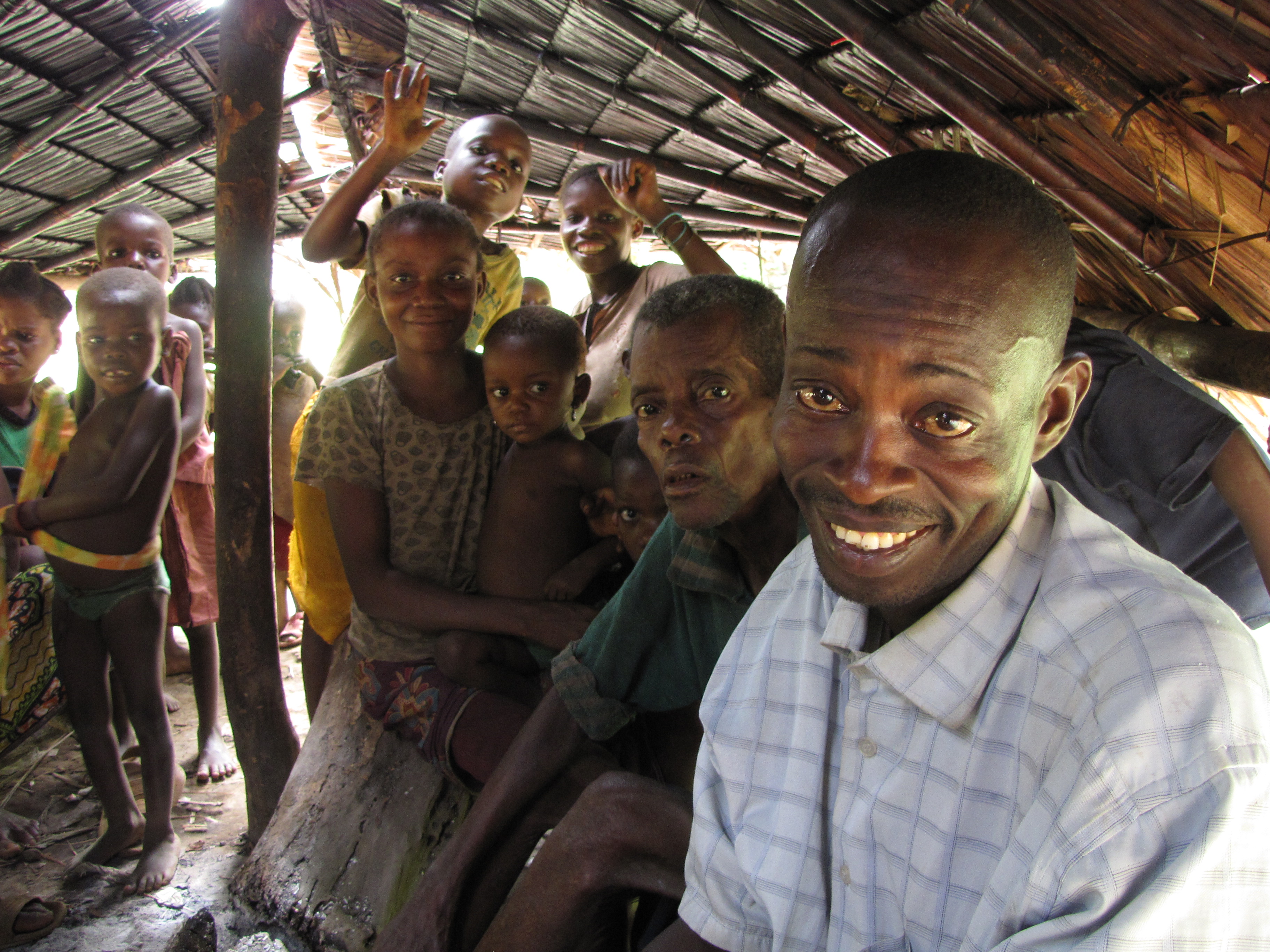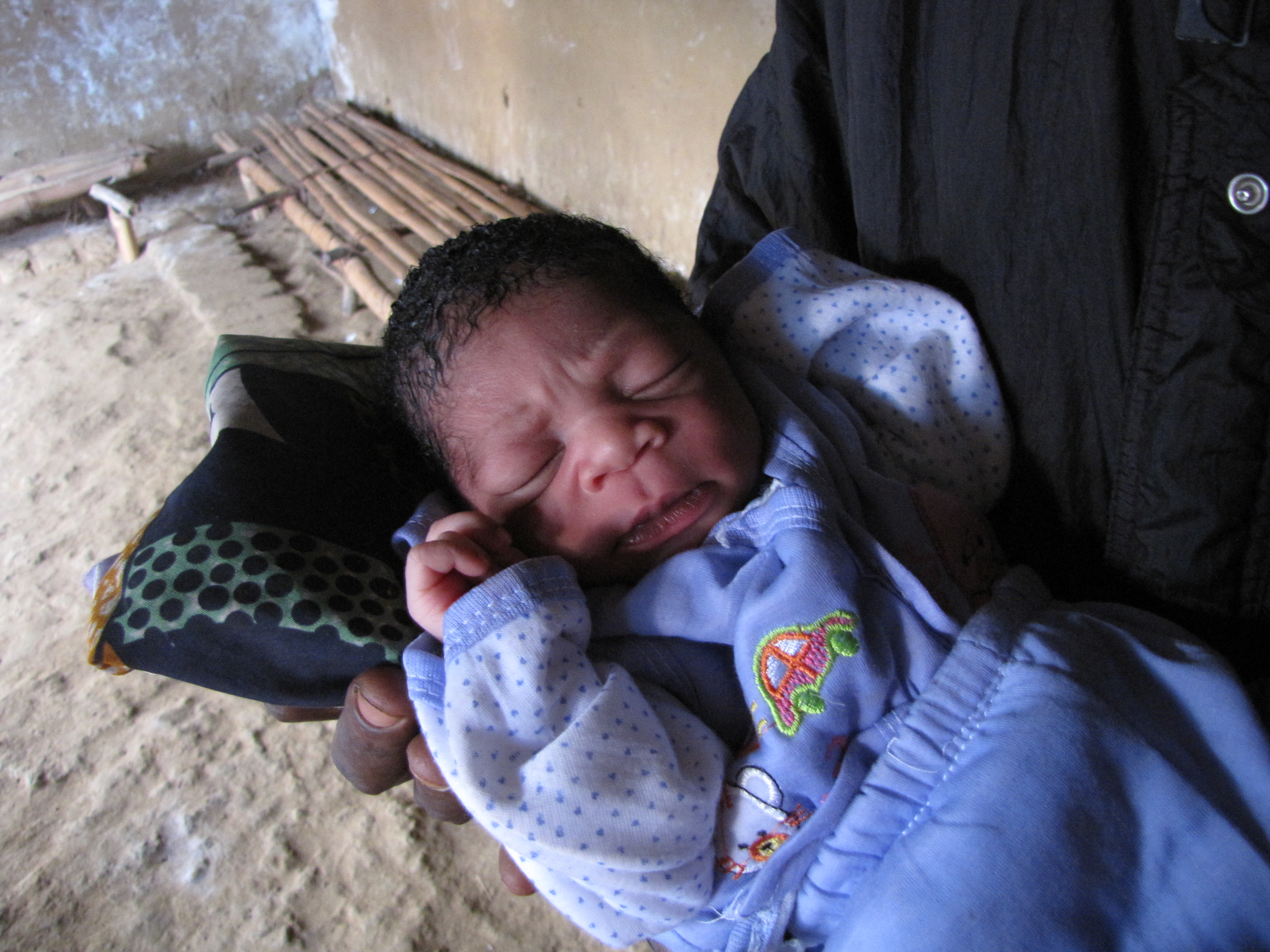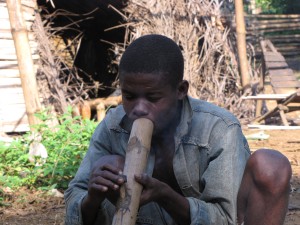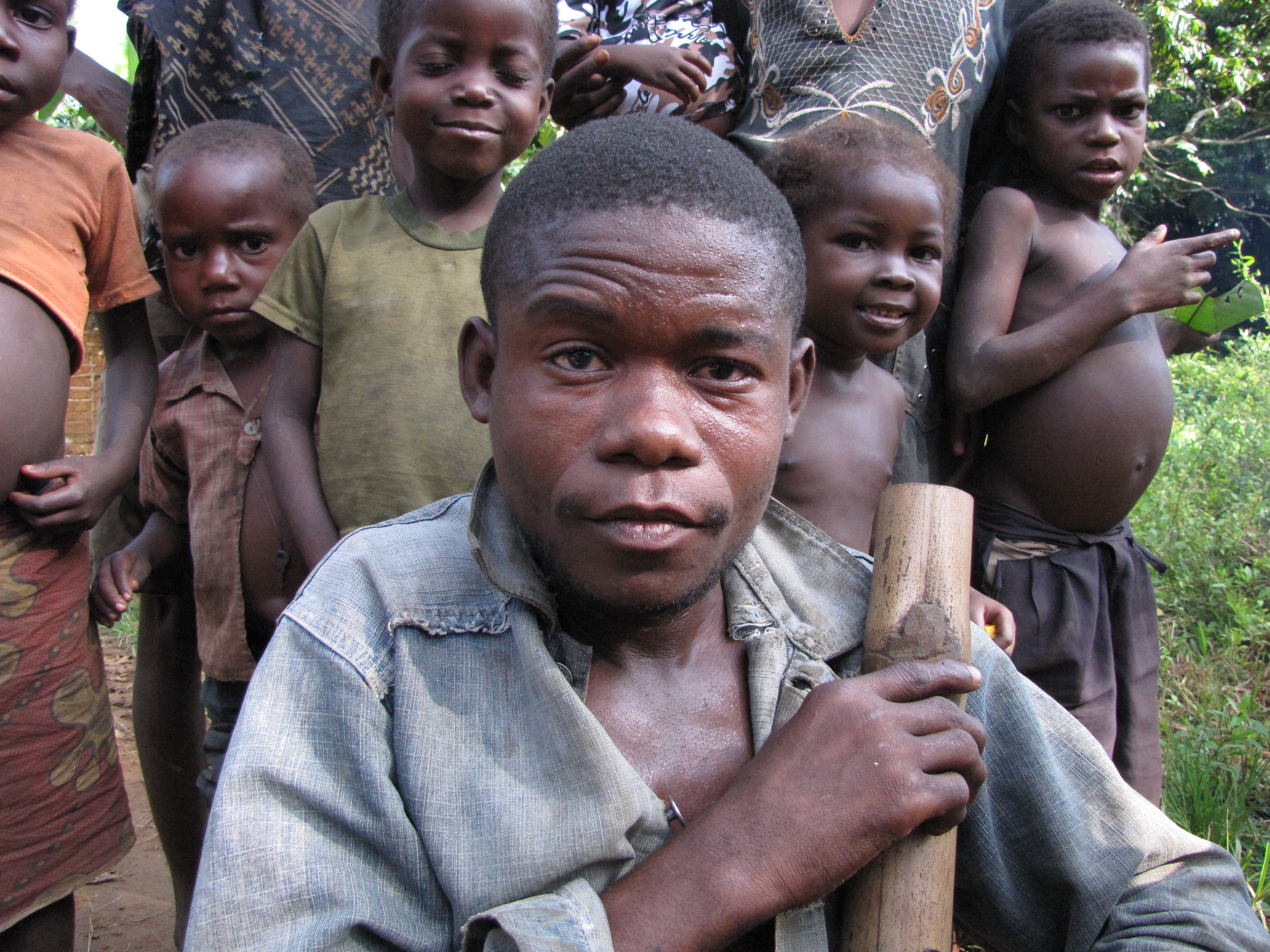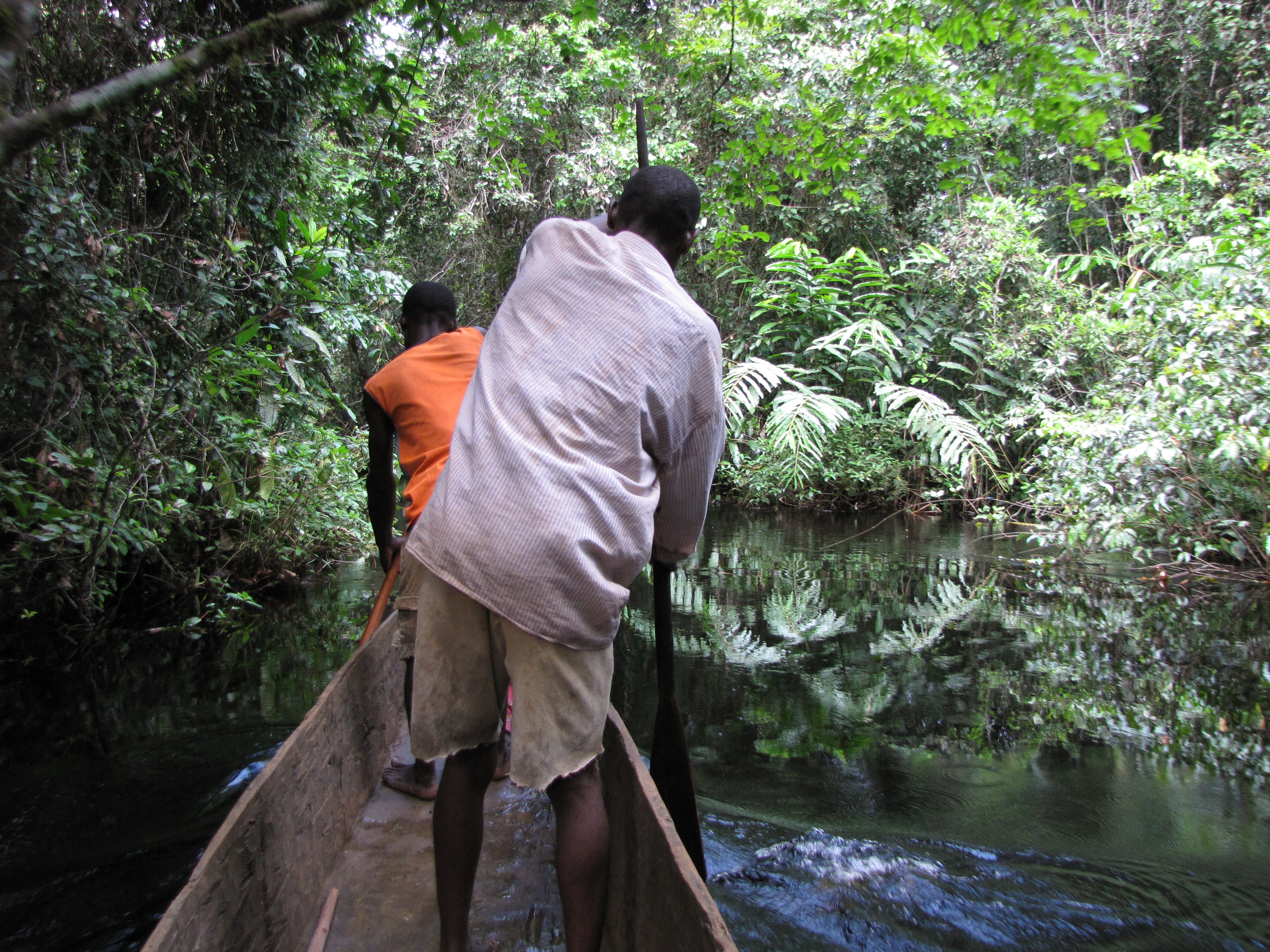This story was told to me in a Pygmy house, in the village of Samba on the Lulonga River, almost exactly on the Equator. The chief’s son, Bokote, a Bantu man, came there to see me and told these stories.
The Boy with no Hands
A Mother gave birth to a beautiful baby boy, who had no hands, or feet, or eyes. What could they do with such a child? They could not afford to keep him, but they did not have the heart to get rid of him. They kept him, looked after him, loved him and fed him; and he grew up strong and healthy, even though he was unable to do anything for himself or for anyone else, and depended entirely on the charity of his family. In time, the parents even managed to find a wife for him, even though they had to provide for them both themselves.
Every day the parents and the wife went into the forest to work, and they had to leave the son at home on his own. Each day they said to him, “All you have to do is watch the pot and try to keep strangers away, in case they steal our food.” Then, they left to do their day’s work.
One day a stranger came to the door and demanded to be given food.
“I have no hands, no feet and no eyes. I can give you nothing,” said the son. But the man peered in through the gaps in the walls. “I can see the food in the pot,” he said. “Give it to me!”
“I don’t see the food,” said the boy. “But if you can see it – eat, and welcome to it.”
The man came in and ate the food.
When the parents and the wife came back, they were very angry that the food had been eaten. “It’s hard enough that we are poor and have to feed you, without you giving away even the little we do have,” they grumbled.
“I am someone who has to live by the charity of others,” said the son. “So how can I refuse charity myself, when someone asks for it?”
The next day they went out again, leaving the son behind; and once again they told him to keep the pot safe; and once again the man came and asked food.
“There is food right next to you,” said the man. “All you have to do is give it to me.”
“I have no hands – how can I give you anything?” said the son. “But if the food is there, please – help yourself.”
So the man ate the food and went on his way. That evening, when the parents and the wife came home, they were more angry than ever. But again the son answered, that as he had to live by charity himself, he could not deny charity to others.
On the third day, the same happened. The man came by and asked the son to carry to pot to him.
“I have no feet, I am unable to move anywhere,” said the son. “But if you see food here, please walk in and take it, and welcome.”
The man did; and when they came home that evening, the wife was so angry she threatened to leave her husband, and the parents could hardly blame her.
“If this carries on, we shall have to take all our food with us each day. We cannot afford this charity you love so much, for anyone who happens to walk past.”
The next day, the strange man returned.
The man said; “I have eaten 3 times. Now I wish to repay my debt. I have some gifts for you, but in return for these gifts, you must make some promises. If you make anything, you must give me the first thing you make. If you collect food, you must give me the first fruits that you pick. Whatever you do you must give me the first fruit of your labour.”
“I can perform no labour, so I can never give you anything,” said the boy bitterly. “But if I ever do, I promise that I shall give the first of it to you.”
The man said to the boy, “Open your eyes he said,” the boy opened his eyes. He could see. “Stand up on your feet,” said the man. The boy stood; he had feet. “Give me your hand, and shake hands with me on our bargain,” said the man. The boy looked down and saw he had hands. He shook hands with the strange man, who smiled, turned around, and left the house.
When the parents and the wife came home, it was to the surprise and delight of their lives. For the first time the boy could see those who loved him. For the first first time he could truly touch his wife. And now there was a strong healthy son and husband to work by the side.
The son proved a quick learner, and very quickly aquired all the skills he should have learned years ago as a boy. He soon found he was particularly good with wood, and very soon he was able to make some chairs, which he took to the market to sell. Everyone was delighted with them; everyone wanted one of his chairs. Soon he was making a good living as a carpenter.
Now that he had hands and feet, the boy loved to exercise. One day walking through the forest he saw a palm tree laden with delicious fruit. Of course he climbed the tree, picked the fruit, ate his fill, and took the rest of the market to sell.
He took some home to eat as well, and his wife had never tasted such delicious fruits from a palm tree in her life. She asked her husband to take into the woods and to show her the tree, and of course he was happy to do as she asked. Once again the boy climbed high up to reach the delicious fruits growing high up in the branches. But as he did, he heard a noise below him. Looking down he saw the strange man.
“Wait there,” he called. “I am collecting fruit for you now. In a moment you will be eating the most delicious palm fruits you have ever tasted.”
The man said, “You have sold the first chair. You have sold the first fruits. You have no respect for our obligation. Now, I want to take back my gifts.
“I want to see my eyes,” he said. And once the eyes fell out of the boy’s head and down to the man’s feet.
“I want to see my feet,” said the man. At once the boy’s feet fell and landed down the man’s feet.
“And now I want to see my hands,” said the man. The hands fell down – and the boy fell down after them. He crashed down and fell to his death on the ground.
The wife wept to see him what had happened. “Who has done this to my husband?” she cried. But there was no one there to answer. The strange man had vanished. She returned to the village to tell the parents what happened to the boy. They searched and searched for the man who could give such shifts and take them back, but no one ever saw him again.
That’s it – only not quite. If this were a western story, we might very well include the moral in thd end. No doubt the poor boy would have seen the error of his ways, or he might have had bad brothers who had no sympathy for the man asking for food; and it would have been them who came to a nasty end, not the hero. But in the Congo, the ending of stories is a little more interactive … it’s a bit like a game. At the end of each story, the story teller would say ..
“Now – what lessons can we learn from this story?” – and then you have to try and find as many lessons as you can.
Let me begin. For one – always keep your bargains. For another – look after your family before you look after others; charity begins at home. the boy appeared more generous than he really was. For another – those with power take unfair venegence.
Any more? I’ll be happy to post any lessons I failed to find ….
That night, I was woken up by music – chanting, shouting, drumming. It was my paddlemen for the next day who had gathered together and were celebrating a journey with Go-Congo. I obviously wasn’t going to be getting any sleep, so I went to join them. We drank agene, the local palm spirit – kind nice; it certainly did the job put it like that. The singing was full of energy and rhythm. But when I say drumming, I don;t really mean drums. All they had were sticks and cans to bang. But like the agene – it did the job!
About an hour in, it turned out we were camped next to the medial centre and while we were chanting and dancing, a baby was being born. Great excrement! And the poor child was christened on the spot.
Poor child, with a name like that! I was invited to make a contribution to his education. How could I say no?
The Pygmy people always live away from the centre of the village in poorer huts. This pygmy found a well known way of passing his time …
… all free from the forest!
The next morning we set off up river again to the next village.
Next time, another village, another story …
